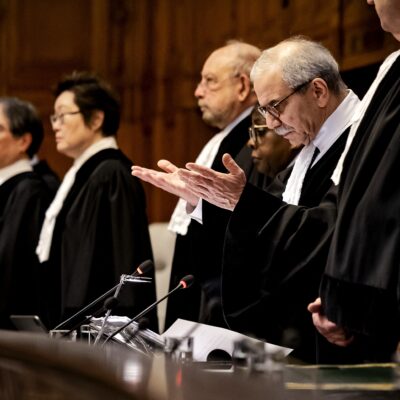Senate Republicans push bill that could revoke Qatar’s major non-NATO ally status
Qatar’s ‘failure to take action against Hamas is beginning to look like tacit support for a foreign terrorist organization designated by the United States,’ Sen. Ted Budd said

Kevin Dietsch/Getty Images
Sen. Ted Budd (R-NC)
Sens. Ted Budd (R-NC), Joni Ernst (R-IA) and Rick Scott (R-FL) introduced legislation on Tuesday that would revoke Qatar’s status as a major non-NATO ally, unless the Gulf nation ends financial support for terrorist groups and expels or extradites Hamas leadership.
The legislation comes after months of increasing frustration from its sponsors over Qatar’s relationship with Hamas and what they view as the country’s insufficient efforts to pressure the terrorist group to secure the release of U.S. hostages. Budd and Ernst recently said that Hamas leadership must be expelled from Qatar.
The bill would instruct the State Department to, within 90 days, conduct a review of the U.S.-Qatar relationship. The department would be asked to certify that Qatar’s status remains in “the national interest of the United States,” that Qatar has “exerted any and all leverage it has over Hamas,” that it has ceased direct or indirect support to terrorist organizations and that it has “expelled or agreed to extradite” any members of Hamas.
If the administration cannot certify all of those points, it would be required to “immediately terminate” Qatar’s status, and would not be able to reimplement it until all of the conditions could be met.
The legislation accuses Qatar of “undercutting negotiations” for a hostage deal with public comments calling for a cease-fire unconditioned on the release of hostages and stating it has no leverage over Hamas.
The bill notes that there is precedent for revoking a state’s major non-NATO ally status, citing Afghanistan after the Taliban takeover, and describes the status as “a privilege which must be continuously earned.”
“I do not introduce this bill to consider terminating Qatar’s major non-NATO ally designation lightly,” Budd said in a statement. “It is not where I started on this relationship, but it is a reflection of where we are today and the warnings that members of Congress have repeatedly given to Qatar about the liability of continuing to host Hamas.”
Budd said that Qatar’s “failure to take action against Hamas is beginning to look like tacit support for a foreign terrorist organization designated by the United States,” describing Doha’s actions as “unacceptable.”
He said he’s been in ongoing conversations with Qatari officials since Oct. 7, and was grateful for the November hostage deal, but expressed frustration with its shifting public rhetoric around pressuring Qatar and a hostage deal.
“This is not acceptable behavior for a major non-NATO ally,” Budd said. “Securing the release of the hostages demands strength and moral clarity. We demand it of our own leaders, and we should require it from our major allies.”
Ernst told Jewish Insider she hasn’t seen the change in posture and attitude from Qatar she’s been looking for.
“I’ve told the foreign minister this — they need to step up,” she said. “They need to make sure Hamas is getting back to the table, or get rid of them.”
Other lawmakers don’t yet seem prepared to take the step laid out in the bill.
Sen. Chris Coons (D-DE), who signed a joint statement with Budd, Ernst and other colleagues last month saying that Qatar should expel Hamas leadership if negotiations fail, indicated he found the bill premature.
“I have reached out directly to the ambassador, to the sheikh, to the foreign minister, to say, ‘You need to do more to pressure Hamas to get to the table, to get a hostage deal.’ I know our president has applied more pressure,” Coons told JI. “Whether we’re at that step” of revoking major non-NATO ally status — “that strikes me as what you do when they demonstrably refuse to do anything substantive. But I think it’s constructive that members are discussing that.”
Sen. Roger Wicker (R-MS), the ranking member of the Senate Armed Services Committee, said he doesn’t think the bill is the right course of action, but said he wasn’t aware of the proposal before being asked about it by JI.
“This strikes me as a step we should be very careful about,” Wicker explained. “Qatar has been a friend in many ways and there are mutual benefits in our two countries continuing to be friends. This is a matter that governments should speak to each other about. My first reaction having just heard this is that it is not called for.”
Sen. Roger Marshall (R-KS) told JI that he hasn’t “seen anything to support” Qatar losing such status.
Defense Secretary Lloyd Austin told lawmakers on Tuesday that Qatar “has done a lot to help get hostages released, and they continue that work” and said the Qatari leadership is “intensely focused on making sure that we can get hostages released as soon as possible.”
Qatar is one of 18 countries designated as a major non-NATO ally, alongside countries including Israel, Egypt, Jordan, Bahrain and Morocco. It was added to the program in 2022. The status provides countries with greater access to U.S. defense systems, technology, training and cooperative programs and is a sign of higher diplomatic esteem.
Administration officials have defended Qatar’s involvement with Hamas, praising the kingdom’s efforts to broker a hostage deal. Qatari leaders have noted that the Hamas office in Doha and Qatari funding of Hamas has been conducted with the consent of the U.S. and Israel. Administration officials have said Qatar plans to reassess its relationship with Hamas after the war.










